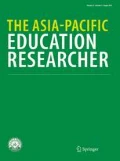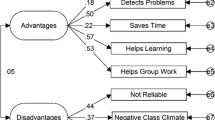Abstract
Due to the scant work done thus far, the present mixed-methods study assessed Education students’ perceptions of and attitudes towards peer assessment (PA) and their effect on the perceived Transfer of PA practices to their future classes. 120 undergraduate multicultural students have participated in the study. The students were given two group assignments in line with the project-based learning approach. During each project presentation to the class, the students were required to individually assess their peers’ group work based on an indicator that was previously designed in collaboration with the teacher. After each assessment, the students filled out the Students’ perceptions of and attitudes towards PA questionnaire. The analysis implied that students’ positive perception of their ability to assess their peers and their trust in their peers’ ability to accurately assess their work are effective factors that might enhance PA skills transfer to their future classes. However, based on the results, a key challenge in PA implementation appeared to be culture-related. The study highlights the need to focus on consolidating trust among students within a heterogeneous classroom during PA processes.



Similar content being viewed by others
References
Ali, N. (Ed.) (2013). Representation of Arab citizens in the institutions of higher education in Israel. Sikkuy: The Association for the Advancement of Civic Equality in Israel. Retrieved from https://www.sikkuy.org.il (Hebrew)
Alt, D., & Geiger, B. (2012). Goal orientations and tendency to neutralize academic cheating: An ecological perspective. Psychological Studies, 57(4), 404–416.
Alt, D., & Raichel, N. (2018). Lifelong citizenship: Lifelong learning as a lever for moral and democratic values. Leiden and Boston: Brill and Sense Publishers.
Ajzen, I. (1988). Attitudes, personality, and behavior. Chicago: Dorsey.
Ajzen, I., & Fishbein, M. (2005). The influence of attitudes on behavior. In D. Albarracin, B. T. Johnson, & M. P. Zanna (Eds.), The handbook of attitudes (pp. 173–221). Mahwah, NJ: Erlbaum.
Baeten, M., Kyndt, E., Struyven, K., & Dochy, F. (2010). Using student-centred learning environments to stimulate deep approaches to learning: Factors encouraging or discouraging their effectiveness. Educational Research Review, 5, 243–260. https://doi.org/10.1016/j.edurev.2010.06.001.
Bandura, A. (1986). Social foundations of thought and action: A social cognitive theory. Englewood Cliffs, NJ: Prentice-Hall.
Ben-Rabi, D., & Hanadin, A. (2013). Preparation for successful integration of Arab students in higher education: Evaluation study on an improvement plan of pre-academic preparation. Report submitted to the Council for Higher Education. Jerusalem: The Myers-JDC-Brookdale Institute. (Hebrew)
Bentler, P. M. (2006). EQS 6 structural equations program manual. Encino, CA: Multivariate Software Inc.
Black, P., Harrison, C., Lee, C., Marshall, B., & William, D. (2003). Assessment for learning- putting it into practice. Maidenhead, U.K.: Open University Press.
Boud, D. (2010). Sustainable assessment: Rethinking assessment for the learning society. Studies in Continuing Education, 22(2), 151–167.
Braun, V., & Clarke, V. (2006). Using thematic analysis in psychology. Qualitative Research in Psychology, 3, 77–101.
Bryant, D. A., & Carless, D. R. (2010). Peer assessment in a test-dominated setting: empowering, boring or facilitating examination preparation? Educational Research for Policy and Practice, 9, 3–15.
Burns, D., Brown, M., McNamara, G., O'Hara, J., Altrichter, H., Nayir, F., et al. (2019). Aiding Culturally Responsive Assessment. A user-friendly handbook for culturally responsive assessment in educational settings. Technical Report. https://doi.org/10.13140/RG.2.2.31798.75844/1.
Chi, M. T. H., & VanLehn, K. A. (2012). Seeing deep structure from the interactions of surface features. Educational Psychologist, 47, 177–188.
Choi, J., & Ziegler, G. (2015). Literacy education for low-educated second language learning adults in multilingual contexts: The case of luxembourg. Multilingual Education, 5(1), 1–21.
Creswell, J. W. (2014). Educational research: Planning, conducting, and evaluating quantitative and qualitative research. Harlow: Pearson.
Day, S. B., & Goldstone, R. L. (2012). The import of knowledge export: Connecting findings and theories of transfer of learning. Educational Psychologist, 47, 153–176.
Dixon, L. Q., & Wu, S. (2014). Home language and literacy practices among immigrant second-language learners. Language Teaching, 47(4), 414–449.
Geiger, B. (2013). Female Arab students’ experience of acculturation and cultural diversity upon accessing higher education in the Northern Galilee-Israel. International Journal of Higher Education, 2, 91–106.
Gijbels, D., Segers, M., & Struyf, E. (2008). Constructivist learning environments and the (im)possibility to change students’ perceptions of assessment demands and approaches to learning. Instructional Science, 36, 431–443.
Hager, T., & Jabareen, Y. (2015). From marginalisation to integration: Arab-Palestinians in Israeli academia. International Journal of Inclusive Education. https://doi.org/10.1080/13603116.2015.1090488.
Hai, A. (2012). Higher education for Arab citizens of Israel realities, challenges and new opportunities. Inter‐Agency Task Force on Israeli Arab Issues. (Hebrew).
Hair, J. F., Hult, G. T. M., Ringle, C. M., & Sarstedt, M. (2017). A primer on partial least squares structural equation modeling (PLS-SEM) (2nd ed.). Thousand Oaks: Sage.
Hendin, A. (2011). The integration of Arab students into the Israeli higher education system. Jerusalem: The Hebrew University of Jerusalem. The Federman School of Public Policy and Government. (Hebrew).
Hofhuis, J., van der Rijt, P. G. A., & Vlug, M. (2016). Diversity climate enhances work outcomes through trust and openness in workgroup communication. SpringerPlus, 5, 714.
Hsia, L. H., Huang, I., & Hwang, G. J. (2015). A web-based peer-assessment approach to improving junior high school students' performance, self-efficacy and motivation in performing arts courses. British Journal of Educational Technology, 47(4), 618–632.
Jiosi, V., & Zalmanson-Levi, G. (2018). Multiculturalism and co-living between Jews and Arabs in teacher training academic institutions. Recommendations document. Tel-Aviv: The Association for Civil Rights in Israel. (Hebrew).
Kritikos, V. S., Woulfe, J., Sukkar, M. B., & Saini, B. (2011). Intergroup peer assessment in problem-based learning tutorials for undergraduate pharmacy students. American Journal of Pharmaceutical Education, 75(4), 1–73.
Li, H. L., Xiong, Y., Zang, X. J., Kornbaher, M., Lyu, Y. S., Chung, K. S., et al. (2016). Peer assessment in the digital age: a meta-analysis comparing peer and teacher ratings. Assessment & Evaluation in Higher Education, 41, 245–264.
Lobato, J. (2003). How design experiments can inform a rethinking of transfer and vice versa. Educational Researcher, 32, 17–20.
Lobato, J. (2012). The actor-oriented transfer perspective and its contributions to educational research and practice. Educational Psychologist, 47, 232–247.
Lorente, E., & Kirk, D. (2013). Alternative democratic assessment in PETE: An action-research study exploring risks, challenges and solutions. Sport, Education and Society, 18(1), 77–96.
Lu, J., & Law, N. (2012). Online peer assessment: effects of cognitive and affective feedback. Instructional Science, 40, 257–275.
Panadero, E. (2016). Is it safe? Social, interpersonal, and human effects of peer assessment: A review and future directions. In G. T. L. Brown & L. R. Harris (Eds.), Handbook of social and human conditions in assessment (pp. 247–266). New York: Routledge.
Panadero, E., Jonsson, A., & Botella, J. (2017). Effects of self-assessment on self-regulated learning and self-efficacy: Four meta-analyses. Educational Research Review, 22, 74–98.
Salomon, G., & Perkins, D. N. (1989). Rocky roads to transfer: Rethinking mechanisms of a neglected phenomenon. Educational Psychologist, 24, 113–142.
Speelman, C. P., Forbes, J. D., Giesen, K., Parkinson, M., & Johnson, L. (2016). The stability of old skills during transfer. SAGE Open, 6, 1–13.
Su, Y. (2015). Ensuring the continuum of learning: The role of assessment for lifelong learning. International Review of Education, 61, 7–20.
Topping, K. J. (2017). Peer assessment: Learning by judging and discussing the work of other learners. Interdisciplinary Education and Psychology, 1(1), 1–17.
Topping, K. J. (2019). Using peer assessment to inspire reflection and learning. London: Tylor and Francis.
Webb, M. (2012). Beginning teacher education and collaborative formative e-assessment. In S. Hatzipanagos & R. Rochon (Eds.), Approaches to assessment that enhance learning in higher education (pp. 107–128). London: Routledge.
Wu, K., Davison, L., & Sheehan, A. H. (2012). Pharmacy students' perceptions of and attitudes towards peer assessment within a drug literature evaluation course. American Journal of Pharmaceutical Education, 76(4), 62.
Zhou, J., Zheng, Y., & Tai, J. H.-M. (2019). Grudges and gratitude: the social-affective impacts of peer assessment. Assessment & Evaluation in Higher Education. https://doi.org/10.1080/02602938.2019.1643449.
Author information
Authors and Affiliations
Corresponding author
Ethics declarations
Conflict of interest
The authors state that they have no conflicts of interest to declare.
Additional information
Publisher's Note
Springer Nature remains neutral with regard to jurisdictional claims in published maps and institutional affiliations.
Rights and permissions
About this article
Cite this article
Alt, D., Raichel, N. Higher Education Students’ Perceptions of and Attitudes Towards Peer Assessment in Multicultural Classrooms. Asia-Pacific Edu Res 29, 567–580 (2020). https://doi.org/10.1007/s40299-020-00507-z
Published:
Issue Date:
DOI: https://doi.org/10.1007/s40299-020-00507-z




